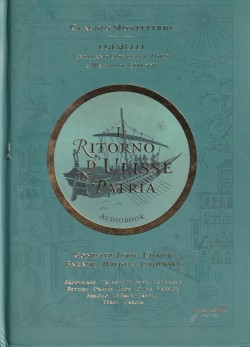 Claudio Monteverdi – Il ritorno d’Ulisse in patria
Claudio Monteverdi – Il ritorno d’Ulisse in patria
Soloists; I Gemelli; Emiliano Gonzalez Toro; Mathilde Etienne
Gemelli Factory audiobook (gemelli-factory.com/nos_releases/il-ritorno-dulisse-in-patria)
There are as many ways to perform Claudio Monteverdi’s Il Ritorno d’Ulisse in Patria as there are performances. The earliest known score contains just the vocal parts, the text and the bass line. Even the instrumental passages indicate nothing about what instruments are to play. So vital decisions about basic elements like orchestration and harmonization must be made.
Terrific recordings have appeared in recent years – those under Gardiner, Cavina and Fuget come happily to mind (not to overlook Harnoncourt’s landmark recording from 1972). But none for me has matched René Jacobs’ 1992 recording for momentum and spirit – that is, until this production from I Gemelli, led by musical director Emiliano Gonzalez Toro and artistic director Mathilde Etienne (with both performing as singers).
A fine-tuned sense of early Baroque style and an adventurous sense of theatre have shaped this recording. The cast here is large – it includes nine tenors! That means remarkably few doublings, so characters are easily distinguishable. And every performer, whether singer or instrumentalist, projects the kind of commitment that gives their time in the spotlight, no matter how brief or extensive, dramatic impact.
It’s unlikely Monteverdi’s instrumental ensemble for the first performance in 1640 would have been as large, or as varied. Historically authentic instruments like the gorgeous triple harp of Marie-Domitille Murez and the delightful trio of mellifluous cornetts add colour. But they never swamp the singers, since they are featured in smaller groups. Instead, they provide vivid counterparts to the resonant phrases of Giacomo Badoaro’s libretto, a skillful adaption of the final verses of Homer’s Odyssey.
Monteverdi gives the gods the most florid passages. Emőke Breath as Minerva ravishes with her lucid elegance. Philippe Jarroussky is an eloquent Fragilitá Umana (Human Fragility), Juan Sancho an impassioned Mercurio. Jérôme Varnier’s petulant, vindictive Nettuno captivates with his rich, agile basso profundo.
Among the mortals, Gonzalez Toro’s Ulisse is deftly theatrical as he disguises himself as an old beggar, and affectingly tender as he pleads with Penelope to recognize him. Rihaieb Chaib brings highly charged urgency and a complex range of emotional states to the role of the faithful Penelope. The exciting Canadian mezzo-soprano has not been known for Baroque opera. But that is bound to change with her powerful performance here. Right from the opening phrases of her heart-rending lament, she commands our empathy. When she does recognize Ulisse – and they finally sing together – it’s all the more expressive for the contrast in their voices. The word “yes” has never sounded more sensual than in their magnificent duet, “Yes, my life, yes, my heart, yes!”
I love how Alix Le Saux as Ulisse’s old nurse Ericleia colours the word “languise” (languishes). Fulvio Bettini’s virtuosic Iro delights as he moves from comedy to tragedy. Zachary Wilder creates a poignant Telemaco, while Etienne brings playful charm to Melanto. Her extensive background essays are bound with the libretto – more than 200 pages in all – with three CDs in an attractive hardbound case. It’s certainly indicative of the loving care that has gone into this superb recording.



